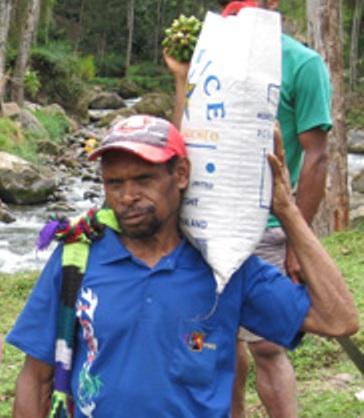Wheat rust on a wheat stem. Image: Evans Lagudah and Zakkie Pretorius.
It’s World Food Day, and this year’s focus is on the role smallholder farmers play in feeding the world.
Food production is at record levels, yet 842 million people are estimated to be suffering from chronic hunger and under-nourishment. Many of these are themselves small family farmers.
We’re trying to do our bit to help subsistence farmers grow more productive crops, combat plant diseases, farm seafood sustainably, develop climate change adaption strategies and grow coffee more sustainably.
One plant we’re working on is cow peas (one of the staple crops in parts of Africa). We recently got a Gates Foundation grant to further our research on improving their productivity.
On a broader scale, we’ve also cracked a problem with a globally-significant crop: wheat. With colleagues from the Sydney and Adelaide Universities, we’ve identified a gene that confers resistance to wheat rust – probably the biggest enemy of wheat crop yields worldwide.
Seafood is a major source of protein in both the developed and developing worlds, and we’ve found a way to farm the most delectable kind of all – prawns – more sustainably. Our Novacq™ fishless prawn food is now licenced for use in several South-East Asian countries. It makes use of the marine microbes at the base of the food chain to produce a prawn food that has the added benefit of increasing their growth rate by around 30 per cent.
Climate change is a pressing problem for us all, but some of the people most at risk are farming communities in countries in southern and south-eastern Asia. We’re collaborating with farmers in parts of Cambodia, Laos, Bangladesh and India to identify, select and test climate change adaptation options that are both viable and suitable for local communities. One of the things we’re aiming to do is develop and test new crop and water management practices for rice-based cropping systems that will outperform existing farming practices and can accommodate future climate variability and climate change.
There are about 400 000 PNG households involved in coffee production
After all that work, we might be tempted to celebrate with a good cup of coffee. Maybe a PNG blend. There are more than 400 000 households involved in coffee production in PNG, and it’s that country’s most important export cash crop.
With our Australian and international partners, we’re developing new ways for farmers and researchers to learn from each other and identify ways to improve the sustainability of PNG’s coffee industry. We hope to identify the points in the coffee-food farming system that can be targeted for the best possible result in retaining and reusing scarce nutrient resources.




16th October 2014 at 2:46 pm
I knew of the Perfect Prawns but hadn’t realised the food was fishless. Given that SBS and ‘Gournet Farmer’ Matthew Evans are about to go on a rampage about what’s really in your seafood – and especially how prawns are produced with 4kg of sea-trash for every 1kg of prawn – this would be something to highlight.
16th October 2014 at 12:15 pm
Ok, I know people will be upset at what I have to say.
Nature has a way of levelling things out. Famine is one of them. Famine in places is caused by over population. Famine is natures way of levelling out the population so the fittest survive on the food they produce. This has been the way of nature since the beginning of life on earth.
Yes, we can save these people now but in a few years their would be three times plus as many to save. As happened to the “Save the Children Campaign” now those people are killing each other for scares resources & once again we are “Saving the Children.”
Humans interfere with nature at their peril. Cruel,but kinder in the long run.